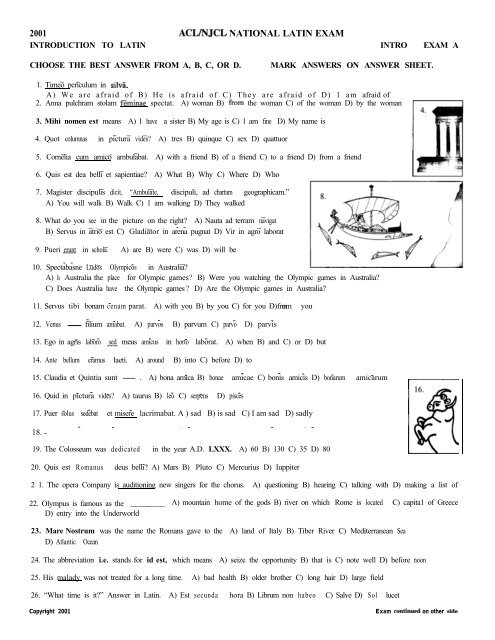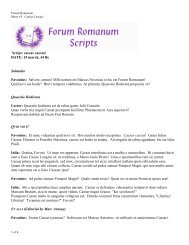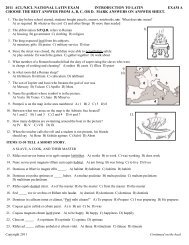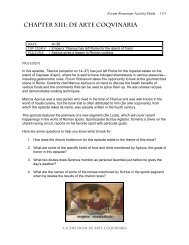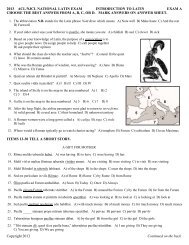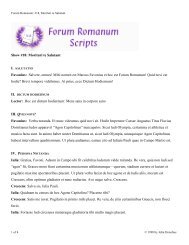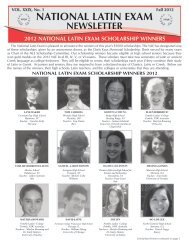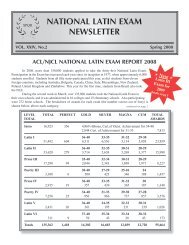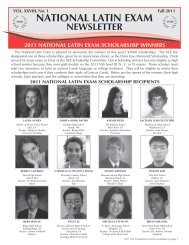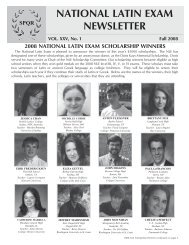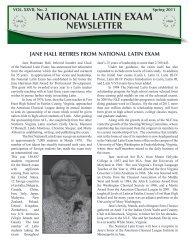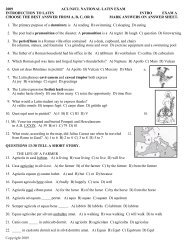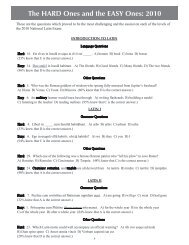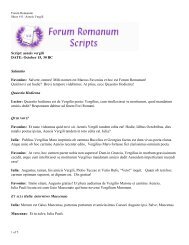2001 ACL/NJCL NATIONAL LATIN EXAM - The National Latin Exam
2001 ACL/NJCL NATIONAL LATIN EXAM - The National Latin Exam
2001 ACL/NJCL NATIONAL LATIN EXAM - The National Latin Exam
Create successful ePaper yourself
Turn your PDF publications into a flip-book with our unique Google optimized e-Paper software.
<strong>2001</strong> <strong>ACL</strong>/<strong>NJCL</strong> <strong>NATIONAL</strong> <strong>LATIN</strong> <strong>EXAM</strong><br />
INTRODUCTION TO <strong>LATIN</strong> INTRO <strong>EXAM</strong> A<br />
CHOOSE THE BEST ANSWER FROM A, B, C, OR D. MARK ANSWERS ON ANSWER SHEET.<br />
1. Timeo periculum in<br />
A) We are afraid siivi% of B) He is afraid of C) <strong>The</strong>y are afraid of D) 1 am afraid of<br />
2. Anna pulchram stolam feminae spectat. A) woman B) ti-om the woman C) of the woman D) by the woman<br />
3. Mihi nomen est means A) 1 have a sister B) My age is C) 1 am fine D) My name is<br />
4. Quot columnas in pictura vides? A) tres B) quinque C) sex D) quattuor<br />
5. Cornelia cum amico ambulabat. A) with a friend B) of a friend C) to a friend D) from a friend<br />
6. Quis est dea belli et sapientiae? A) What B) Why C) Where D) Who<br />
7. Magister discipulis dicit, “Ambulate, discipuli, ad chartam geographicam.”<br />
A) You will walk B) Walk C) 1 am walking D) <strong>The</strong>y walked<br />
8. What do you see in the picture on the right? A) Nauta ad terram navigat<br />
- -<br />
B) Servus in atrio est C) Gladiator in arena pugnat D) Vir in agro laborat<br />
9. Pueri erunt in schola. A) are B) were C) was D) will be<br />
- -<br />
10. Spectabasne Ludos Olympicos in Australia?<br />
A) Is Australia the place for Olympic games? B) Were you watching the Olympic games in Australia?<br />
C) Does Australia have the Olympic games ? D) Are the Olympic games in Australia?<br />
11. Servus tibi bonam cenam parat. A) with you B) by you C) for you D)from m you<br />
12. Venus filium amabat. A) parvos B) parvum C) parvo D) parvis<br />
13. Ego in agris laboro sed meus amicus in horto laborat. A) when B) and C) or D) but<br />
14. Ante bellum eramus laeti. A) around B) into C) before D) to<br />
15. Claudia et Quintia sunt - . A) bona amica B) bonae amicae C) bonis amicis D) bonarum amicarum<br />
16. Quid in pictura vides? A) taurus B) leo C) serpens D) pisces<br />
17. Puer solus sedebat et misere<br />
- -<br />
19. <strong>The</strong> Colosseum was dedicated in the year A.D. LXXX. A) 60 B) 130 C) 35 D) 80 Li!!?<br />
20. Quis est Romanus deus belli? A) Mars B) Pluto C) Mercurius D) Iuppiter<br />
Iuno.<br />
-<br />
_ _ -<br />
Regmis D) Regmae<br />
2 1. <strong>The</strong> opera Company is auditioning new singers for the chorus. A) questioning B) hearing C) talking with D) making a list of<br />
22. Olympus is famous as the __ A) mountain home of the gods B) river on which Rome is located C) capita1 of Greece<br />
D) entry into the Underworld<br />
23. Mare Nostrum was the name the Romans gave to the A) land of Italy B) Tiber River C) Mediterranean Sea<br />
D) Atlantic Ocean<br />
24. <strong>The</strong> abbreviation i.e. stands for id est, which means A) seize the opportunity B) that is C) note well D) before noon<br />
25. His malady was not treated for a long time. A) bad health B) older brother C) long hair D) large field<br />
26. “What time is it?” Answer in <strong>Latin</strong>. A) Est secunda hora B) Librum non habeo C) Salve D) Sol lucet<br />
Copyright <strong>2001</strong> <strong>Exam</strong> continued on other side<br />
16.
27. <strong>The</strong> Greek goddess of wisdom, Athena, was known to the Romans as . A) Juno B) Minerva C) Proserpina D) Venus<br />
28. It is a herculean task for schools to meet the technological needs of today’s students.<br />
A) necessary B) extremely difficult C) very expensive D) pointless<br />
29. Hannibal was a great general who was born in the city of Carthage in Africa. What<br />
number on the map refers to Africa? A) 4 B) 5 C) 6 D) 7<br />
30. Hannibal left Hispania and marched over the Alps with his army to make war on<br />
Rome. What number is Hispania on the map? A) 4 B) 6 C) 1 D) 5<br />
READ THE STORY AND ANSWER THE QUESTIONS.<br />
LEO ET MUS<br />
A lion and a mouse have an adventure.<br />
Magnus leo in Silva dormiebat. Circum leonem<br />
multis mures ludebant<br />
nasum<br />
parvis pedibus tangebat. e somno excitabatur<br />
et parvum murem videbat. Leo unum pedem<br />
movèbat et murem capiebat. Mus territus clamabat,<br />
“0 rex bestiarum, tuum nasum tangere<br />
nolebam. Te timeo. Noli me edere Tibi<br />
magnum donum dabo.” Leo respondebat, “Miser<br />
mus es, sed tii es parvus. Te non edam.”<br />
Postero die leo per silvam ambulabat. Subito leo<br />
in laqueum ambulat. Leo vocat et mus leonem<br />
audit. Miis pedes leonis in laqueo videt et dentibus<br />
nodos --. dissecat Mus dicit, “Tu me non<br />
- -<br />
edebas, et nunc tibi magnum donum do.”<br />
Adapted from Aesop’s Fables<br />
Mus = mouse<br />
31. What is the lion doing (line l)? A) sleeping B) playing C) hunting D) waiting<br />
2 miiri5s = mice; lud2bant = were playing; niisum = nose<br />
3 pedibus = with (his) paws; tangcbat = touched; excitabatur = was awakened<br />
4 miirem = mouse<br />
5 capiebat = seized<br />
6<br />
7 nGbam = 1 did not wish; Noli . . . edere = Don? eat<br />
8<br />
9 non edam = 1 shall not eat<br />
10 Postero die = <strong>The</strong> next day<br />
11 laqueum = snare, net<br />
12<br />
13 Gd% = rope; dissecat = cuts<br />
14<br />
32. What did the mouse do (lines 2-3)? A) touched the Iion’s nose B) ran away C) chewed the lion’s nose D) washed his paws<br />
33. When the lion woke up (lines 3-5), he A) drank some water B) scratched his nose C) roared loudly D) caught the mouse<br />
34. What did the mouse call the lion (line 6)? A) Leo B) King of Beasts C) Your Honor D) Dear Sir<br />
35. In line 6, tangere is best translated A) touching B) 1 am touching C) we touched D) to touch<br />
36. In lines 7-8, the mouse says he will A) give the lion a great gift B) bite the lion C) not touch the lion again<br />
D) worship the lion<br />
37. What does the lion do (line 9)? A) chases the mouse B) smacks the mouse with his paw C) decides not to eat the mouse<br />
D) goes back to sleep<br />
38. What does the lion do the next day (line 10)? A) he meets another mouse B) he sees a man C) he flees from the woods<br />
D) he walks through the woods<br />
39. <strong>The</strong> best translation of Mus pedes leonis videt (line 12) is A) the mouse sees the paws of the lion<br />
B) the feet of the mouse are small C) the paws of the lion capture the mouse D) the lion sees the feet of the mouse<br />
40. What gift does the mouse give to the lion. 7 A) food B) freedom C) a new home D) a net<br />
Copyright <strong>2001</strong>
<strong>2001</strong> <strong>ACL</strong>/<strong>NJCL</strong> <strong>NATIONAL</strong> <strong>LATIN</strong> <strong>EXAM</strong> <strong>LATIN</strong> 1 1 <strong>EXAM</strong> B<br />
CHOOSE THE BEST ANSWER FROM A, B, C, OR D. MARK ANSWERS ON ANSWER SHEET.<br />
1. Cur Caesar in Curiam vcnit? A) How B) When C) Why D) Who<br />
2. Helena et Clytemnestra erant _ Ledae. A) filiae B) filiarum C) filia D) filiam<br />
3. Neptunus naves placide spectabat. A) calms B) calmly C) to calm D) he will calm<br />
4. Me vocat neque respondeo. A) and B) or C) and...not D) although<br />
5. Nos fabulam de Aurora et Tithono scimus. A) We B) You C) He D) <strong>The</strong>y<br />
6. Venus Troianis auxilium dedit. A) of the Trojans B) to the Trojans C) by the Trojans D) with the Trojans<br />
7. Cornelius epistulam annulo signavit. A) his ring ‘B) of his ring C) on his ring D) with his ring<br />
8. Pueri e silvis quod 1upos timent. A) currit B) curris C) currimus D) currunt<br />
9. Festinate, servi, ad fontem et portate aquam ad culinam. A) Hurry B) TO hurry C) <strong>The</strong>y will hurry D) You hurried<br />
10. Hercules monstrum vulneravit. A) saevus B) saevi C) saevum D) saevo<br />
11. Prometheus hominibus dedit. A) ignis B) igni C) ignem D) igne<br />
12. Mox erit Aprilis et Proserpina sub terrà non habitabit. A) it is B) it will be C) it was D) it has been<br />
- -<br />
13. Flavia ad forum ambulabit; ad theatrum ambulabo. A) ego B) tu C) nos D) vos<br />
14. Femina regi libros démonstravit. A) is showing B) to show C) will show D) showed<br />
15. Dominus sine servis in Foro erat. A) by slaves B) for slaves C) after slaves D) without slaves<br />
16. Puella territa in lecto matris dormire cupiebat. A) she sleeps B) to sleep C) they sleep D) having slept<br />
17. Cerberus erat custos remi Plutonis. A) of Pluto’s kingdom B) by Pluto’s kingdom C) with Pluto’s kingdom D) from Pluto’s kingdom<br />
18. Cur lacrimas, _ ? Esne miser? A) Lucius B) Luci C) Lucium D) Lucio<br />
19. When the poet Ovid advised Roman men to meet girlfriends at the chariot races, where was he sending them?<br />
A) amphitheater B) circus C) baths D) theater<br />
20. If you were asked Quaenam tempestas est?, you might answer A) Hodie so1 lucet. B) Ambula ad ianuam. C) Est magnum donum tibi.<br />
D) Claram fabulam recitabo.<br />
2 1. <strong>The</strong> lararium, the shrine to the household gods, was usually found in this reception room of a Roman house.<br />
D) culina<br />
A) atrium B) peristylium C) triclinium<br />
22. Osiris was the Egyptian lord of the Underworld; his Roman counterpart was A) Jupiter B) Neptune C) Pluto D) Apollo<br />
23. Which Roman saying represents the idea that slow and steady is better than fast and reckless.?<br />
D) cum grano salis<br />
A) caveat emptor B) festina lente C) cave canem<br />
24. Newfoundland is a maritime province in Canada. Maritime means bordering on the A) mountains B) desert C) sea D) city<br />
25. Even the gods feared the arrows of Cupid, the son of A) Juno B) Minerva C) Diana D) Venus<br />
26. Which of the following should you say to someone who did you afavor7 A) Gratias tibi ago. B) Silentium, quaeso. C) Surgite, omnes D) Vale, puer.<br />
27. When the abbreviation A.D. is used in a text, it stands for<br />
D) before the birth of Christ<br />
A) during the Roman monarchy B) after the year 1000 C) in the year of our Lord<br />
28. Mosaic, a decorative technique found in many Greek and Roman homes, features<br />
C) pictures formed by small bits of glass or stone D) ivy-covered archways<br />
A) sculptures done in miniature B) intricate brick walls<br />
READ THE PASSAGE AND ANSWER THE QUESTIONS.<br />
ANUNUSUALOCCURRENCE<br />
<strong>The</strong> appearance of the phoenix, a mythical bird, causes much discussion.<br />
Olim, phoenix ad Aegyptum ex Arabia venit. Erat miraculum! Philosophi Aegypti et<br />
1 olim = once upon a time<br />
Graeci multa de miraculo rogabant. Omnes philosophi de tribus rebus consentiebant. Avis est 2 consentiebant = were agreeing; Avis = bird<br />
sacer Soli Avis oculos novos et pinnas distinctas habet. Formam diversam 5 ceteris avibus 3 Soli=<br />
to the Sun God; ccteris = other<br />
habet. Autem, philosophi de omnibus rebus non consentire poterant. De aetate avis disputant: 4 poterant = were able; aetate = age<br />
habetne D annos aut MCDLXI? Eratne vere phoenix?<br />
5<br />
Tandem, omnes philosophi dc his rebus cònsentiunt. Ubi phoenix est senex et mors 6 bis = these; senex = old<br />
appropinquat, nidum in Arabia aedificabit. In nido erit parvus phoenix. Ubi parvus phoenix 7 nidum = nest<br />
poterit volare, corpus patris ad aram Solis portabit. Phoenix tum corpus patris incendet.<br />
Adapted from <strong>The</strong> Annals of Tacitus, Bk. VI, xxviii-xxix<br />
8 poterit volare = will be able to fly<br />
29. <strong>The</strong> phoenix (line 1) carne to A) Rome B) Egypt C) Arabia D) Greece<br />
30. <strong>The</strong> wise men considered the bird’s arriva1 (lines l-2) A) norma1 B) frightening C) too late D) wonderful<br />
3 1. According to lines l-2 (Philosophi...rogabant), the arriva1 of the phoenix caused the philosophers to A) condemn exotic cities B) ask many things<br />
C) study other animals D) pray to the Sun God<br />
32. <strong>The</strong> best translation of de tribus rebus (line 2) is A) away from three things B) down from three things C) for three things D) about three things<br />
33. According to line 3, the phoenix is easily recognized by its distinctive feathers and A) strange eyes B) shrill cry C) large claws D) white tail<br />
34. According to lines 3-4, the phoenix A) gleamed in the sun B) was large and awkward C) looked like the Sun God D) was different from other birds<br />
35. Some of the wise men believed that the phoenix lived for 500 years, but others thought it lived for _ years. A) 1,95 1 B) 1,87 1 C) 1,69 1<br />
D) 1,461<br />
36. <strong>The</strong> best translation of Eratne vere phoenix? (line 5) is A) Was the phoenix coming again? B) Where was the phoenix? C) Was it tmly a phoenix?<br />
D) What was a phoenix?<br />
37. <strong>The</strong> old phoenix will build a nest when (lines 6-7) A) it finds a mate B) the old nest is threatened C) Egypt is at war D) it is nearing death<br />
38. <strong>The</strong> old phoenix will die when the small phoenix (lines 7-8) A) can fly B) builds its own nest C) drives it from the nest D) devours it<br />
39. In line 8, when the old phoenix dies, the small phoenix carries its body to A) a nest in Greece B) a sea near Arabia C) the altar of the Sun God<br />
D) a burial place in Egypt<br />
40. At the end of this story, the small phoenix will A) burn the body of its parent B) to its parent C) rebuild the nest D) retum to Egypt<br />
copyright <strong>2001</strong>
<strong>2001</strong> <strong>ACL</strong>/<strong>NJCL</strong> <strong>NATIONAL</strong> <strong>LATIN</strong> <strong>EXAM</strong> <strong>LATIN</strong> II II <strong>EXAM</strong> C<br />
CHOOSE THE BEST ANSWER FROM A, B, C, OR D. MARK ANSWERS ON ANSWER SHEET.<br />
1. Nymphae magno gaudio cantabant et saltabant. A) sing and dance B) were singing and dancing C) will sing and dance D) have sung and danced<br />
2. Omnes libri de Vesuvio a discipulis lecti sunt. A) were reading B) will be read C) have been read D) had been read<br />
3. Mercurius est celerior quam alii dei. A) than B) how C) which D) who<br />
4. Omnes scimus Hannibalem multis proeliis Romanos superavisse. A) defeats B) will defeat C) defeated D) had been defeated<br />
5. He worked on the project all night. A) tota nox B) totam noctem C) totius noctis D) totis noctibus<br />
6. Which of the following is NOT an infinitive ? A) esse B) posse C) agite D) velle<br />
7. Senatores a consule convocabantur. A) of the consul B) by the consul C) to the consul D) near the consul<br />
8. Hi discipuli celerius laborant quam illi. A) very quickly B) quickly C) as quickly as possible D) more quickly<br />
9. Nero erat _ post Claudium. A) imperatore B) imperatori C) imperator D) imperatorum<br />
10. Quis est pulcherrima puella _ prope te sedet? A) quae B) cui C) quas D) cuius<br />
11. Filii magna cum cura laborant; itaque pater eos laudat. A) them B) him C) her D) they<br />
12. Lupus, a pueris territus, ex agro celerrime cucurrit. A) frightens B) has frightened C) will be frightened D) frightened<br />
13. Galli pacem cum Romanis facient. A) have made B) will make C) had made D) were making<br />
14. Cives putaverunt Caesarem esse optimum ducem. A) good B) well C) best D) better<br />
15. Quot sunt quinque et quattuordecim.? A) quindecim B) undeviginti C) viginti D) septendecim<br />
16. Magister pueris dicit, “Diligenter scribite!” A) To write carefully B) Write carefully C) I have written carefully D) <strong>The</strong>y are writing carefully<br />
17. Gladiatores bestias __ non timent. A) ferocibus B) ferocium C) feroces D) feroci<br />
- -<br />
18. Select the best translation of this quote from Juvenal: Quis<br />
custodiet ipsos custodes? A) Whose guards will guard us?<br />
B) Who will guard the guards themselves? C) Will the guards guard themselves? D) Whom are the guards guarding?<br />
19. <strong>The</strong> Spanish tiempo, the French temps, and the English temporary are derived from the <strong>Latin</strong> A) templum B) tempestas C) tempus D) temptare<br />
20. Which of the following cities was located in northern Africa. ? A) Carthage B) Brundisium C) Naples D) Athens<br />
21. What action of Julius Caesar is often referred to when one makes an irrevocable decision?<br />
C) crossing the Rubicon D) becoming Pontifex Maximus<br />
A) invading Britain B) revising the calendar<br />
22. Constantinople fell to the Turks in A.D. 1453. How would this number be represented in Roman numerals ?<br />
D) MDCCIII<br />
A) MCDLIII B) MDLIII C) MXLIII<br />
23. <strong>The</strong> hunter took a circuitous path through the woods. Circuitous means A) scenic B) direct C) well-marked D) roundabout<br />
- -<br />
24. <strong>The</strong> idiom prima luce means A) at sunset B) all day C) at dawn D) in the afternoon<br />
25. <strong>The</strong> senator cogitated for a long time before he cast his vote. <strong>The</strong> best definition of cogitated is A) labored B) thought C) argued D) talked<br />
26. Which official presided over the Roman senate and commanded the army in war. ? A) quaestor B) aedile C) praetor D) consul<br />
27. Which of the following is the closest in meaning to the <strong>Latin</strong> expression quid pro quo. ?<br />
D) Serva me; servabo te<br />
A) Vive hodie B) Festina lente C) Parentes ama<br />
28. <strong>The</strong> hero associated with a labyrinth, a ball of string, and the Minotaur is A) Hercules B) Jason C) Ulysses D) <strong>The</strong>seus<br />
29. Which mythological character was changed into a tree.? A) Daphne B) Proserpina C) Arachne D) Medea<br />
30. <strong>The</strong> legendary Roman patriot who helped depose the last king of Rome and who was elected first consul of the Roman Republic was A) Brutus<br />
B) Appius Claudius C) Cincinnatus D) Romulus<br />
READ THE STORY AND ANSWER THE QUESTIONS.<br />
PASTOR ET CAPRI<br />
This is a story about a goatherd, his own goats, and some wild goats.<br />
Olim pastor capros suos in agro custodiebat. Subito multos capros feros in agrum 1 pastor = goatherd; capros = goats; feros = wild<br />
intrantes vidit. Hi feri capri manebant et in agro ludebant. 2<br />
Vespere pastor capros suos et capros feros domum duxit. Pastor capris feris multum 3 Vespere = in the evening<br />
frumentum dedit, sed suis capris multum frumentum non dedit. Cur capris feris multum 4 friimentum = grain<br />
frumentum dedit? Pastor speravit capros feros cum suis capris mansuros esse, nam 5<br />
multos capros cupiebat. 6<br />
Postridie pastor omnes capros in agrum duxit. Statim capri feri ex agro fugiebant. 7 Postridie = the next day<br />
Pastor, fugientes capros videns, erat iratissimus. Clamavit, “Vos ingrati! Vobis multum 8<br />
friimentum heri dedi. Cur fugitis?” 9 heri = yesterday<br />
Unus caper respondit, “Nobis multum frumentum dedisti sed tuis capris multum fru- 10<br />
mentum non dedisti. Tecum manere non possumus quod alii novi capri venient sed 11<br />
nobis multum frumentum non dabis. Tibi credere non possumus! Vale!” 12<br />
Adapted from Aesop’s Fables<br />
3 1 <strong>The</strong> goatherd saw (lines l-2) that A) his goats were leaving the field B) his own goats were not grazing C) wild goats were coming into the field<br />
D) wild goats were climbing the hill<br />
32. In line 2, intrantes is best translated A) having entered B) about to enter C) entering D) to enter<br />
33. In the evening, the goatherd (line 3) A) took only his own goats back home B) took only the wild goats back home C) kept the wild goats in the field<br />
D) took all the goats back home<br />
34. When the goatherd fed the goats, he (lines 3-4) A) gave a lot of grain to all the goats B) gave no grain to his own goats<br />
C) gave a lot of grain to the wild goats D) gave the same amount of grain to all the goats<br />
35. In line 5, mansuros esse is best translated as A) would remain B) to remain C) remained D) are remaining<br />
36. Why did the goatherd want the wild goats to stay (lines 5-6)? A) the wild goats were big and healthy B) he had lost some of his own goats<br />
C) he wanted to have many goats D) the wild goats were obedient<br />
37. <strong>The</strong> next day (line 7) the goatherd took _ to the field. A) none of the goats B) all of the goats C) only his goats D) only the wild goats<br />
38. When the wild goats arrived at the field, they (line 7) A) played B) ran around C) grazed D) ran away<br />
39. In lines 8-9, the goatherd shouted A) Did you eat the grain? B) Go away. C) Look at all the goats. D) Why are you fleeing?<br />
40. <strong>The</strong> goat’s reply (lines l0- 12) reveals the moral A) Better late than never B) <strong>The</strong>re is no accounting for taste C) When it rains it pours<br />
D) One who cheats his own cannot be trusted<br />
copyright <strong>2001</strong>
<strong>2001</strong> <strong>ACL</strong>/<strong>NJCL</strong> <strong>NATIONAL</strong> <strong>LATIN</strong> <strong>EXAM</strong> <strong>LATIN</strong> III-IV PROSE <strong>LATIN</strong> III <strong>EXAM</strong> D<br />
CHOOSE THE BEST ANSWER FROM A, B, C, OR D. MARK ANSWERS ON ANSWER SHEET. <strong>LATIN</strong> IV <strong>EXAM</strong> F<br />
1. Vidi viros simillimos illis A) of those B) by those C) from those D) to those<br />
2. Feminam clamantem in via invenimus. A) shouting B) shouted C) about to shout D) to shout<br />
3. Servus ad villam quam celerrime cucurrit. A) quickly B) more quickly C) very quickly D) as quickly as possible<br />
4. Scio _ linguam <strong>Latin</strong>am intellegere. A) tui B) tibi C) te D) tu<br />
5. Mittit nuntium ad regem ipsum A) that B) certain C) your D) himself<br />
6. Ille mihi videtur amisisse mentem! A) about to lose B) to have lost C) he had lost D) to lose<br />
7. Nos sequemur te ad fines orbis terrarum! A) we were following B) we have followed C) we shall follow D) we are following<br />
8. Caesar Gallos pugnandis multis proeliis vicit.<br />
D) while fighting many battles<br />
A) for fighting many battles B) by fighting many battles C) after many battles had been fought<br />
9. Camillus erat tam fortis ut Romam servare -. A) potest B) poterat C) posset D) poterit<br />
10. Meus pater tres dies Capuae manebit. A) from Capua B) at Capua C) to Capua D) for Capua<br />
11. Tribunus novas leges toti urbi nuntiabit. A) by the whole city B) to the whole city C) around the whole city D) of the whole city<br />
12. Feminae nesciverunt cur servi ad flumen ducti essent. A) might lead B) were leading C) are being led D) had been led<br />
13. Non modo discipuli sed etiam parentes illum magistrum amaverunt. A) Not only...but also B) Some...others C) Not...even D) Neither...nor<br />
14. Licet ei appropinquare templo. A) It is permitted for him B) Let him be permitted C) He will permit D) I gave him permission<br />
15. Si Marcus Antonius hostes vicisset, Cleopatra Romanos rexisset. A) were conquering.. .would rule B) is conquering.. .is ruling<br />
C) had conquered.. .would have ruled D) should conquer.. .would rule<br />
16. Patre necato Tullia coniugem regem salutavit.<br />
D) Her father being a killer<br />
A) After her father had been killed B) About to kill her father C) Since her father had killed her<br />
17. Hoc flumen latius illo est. A) that one B) than that one C) to that one D) by that one<br />
18. Novus princeps ludos circenses populo daturus est. A) will be given B) is giving C) is going to give D) must give<br />
19. Sallust’s description of Catiline as having satis eloquentiae, sapientiae parum<br />
C) metaphor D) anaphora<br />
shows an ABBA word arrangement called A) litotes B) chiasmus<br />
20. In Roman mythology, the were responsible for controlling the length of one’s life. A) Fates B) Nymphs C) Muses D) Furies<br />
21. What area of Rome was originally set aside for military training and mass voting ? A) Campus Martius B) Forum C) Flavian Amphitheater D) Circus Maximus<br />
22. <strong>The</strong> investigators found an incendiarv device in the rubble. A) poisonous B) defective C) dangerous D) flammable<br />
23. <strong>The</strong> abbreviation A.U.C. (ab urbe condita) refers to<br />
D) the dedication of a temple<br />
A) a senatorial decree B) a military formation C) a system of numbering years<br />
24. When an ancient city is described as having cvclopean walls, it means that its walls were<br />
D) in existence for more than a century<br />
A) made of giant stones B) sparkling white C) easy to destroy<br />
25. When a Roman orator spoke to the people in the Forum, he would usually stand<br />
C) on the steps of the temple of Vesta D) on the rostra<br />
A) at the door of the Curia B) in a basilica<br />
26. <strong>The</strong> boy was considered a rara avis by his friends. A rara avis is<br />
D) an unreliable teammate<br />
A) an unusual person B) an average student C) a generous friend<br />
27. Which author wrote letters that include an eyewitness account of the eruption of Mt. Vesuvius in A.D. 79 and references to early Christians in Asia Minor?<br />
A) Cicero B) Caesar C) Augustus D) Pliny<br />
28. When Julius Caesar crossed the_ River, he defied the Roman Senate and declared war on Rome. A) Tiber B) Rubicon C) Nile D) Rhine<br />
29. My parents only gave me one caveat about living in a strange city. A) a bit of information B) favorable thought C) argument D) warning<br />
30. When the poet Juvenal talked about panem et circenses, he was referring to<br />
C) making a sacrifice D) shopping in the marketplace<br />
READ THE STORY AND ANSWER THE QUESTIONS.<br />
672 BC: THE ROMANS AND THE ALBANS CLASH<br />
With war about to break out between the Romans and the Albans,<br />
the Roman king sends a message to the Alban king.<br />
A) entertaining the common people B) cheering a victorious general<br />
Tullus Hostilius, rex Romanorum, civibus Albae Longae, “Nuntiate haec,” inquit, “rcgi<br />
vestro Gaio Cluilio: Cum nuntios res repetantes ad Albam Longam misimus, Albani hos<br />
nuntios aspernati sunt dimiseruntque. Nunc igitur inferant di immortales in Albanos omnes<br />
clades huius belli!”<br />
Domum revertuntur cives Albani et haec verba regi nuntiant. Bellum utrimque summo<br />
labore parabatur, civili bello simillimum, prope inter parentes natosque. Nam et Romani et<br />
Albani ab stirpe Troiano orti sunt: Lavinium ab Troia, Alba<br />
-<br />
ab<br />
.-<br />
Lavinio, Romani ab regibus<br />
Albanorum. Eventus tamen belli minus miserabilem dimicationem fecit, quod nullum<br />
proelium pugnatum est et, paucis tectis dirutis, duo populi in unum coniuncti sunt.<br />
Adapted from Livy’s Ab Urbe Condita, I.xxii-xxiii<br />
1<br />
2 res repetantes = demanding satisfaction<br />
3 aspernati sunt = rejected<br />
4 clades = disasters<br />
5 utrimque = on both sides<br />
6 prope = as if<br />
7 stirpe = lineage<br />
8 Eventus = outcome, end result; dimicationem = struggle<br />
9 dirutis = destroyed<br />
3 1. In line 1, Tullus Hostilius is addressing A) his generals B) the citizens of Alba Longa C) the Roman citizens D) the Roman gods<br />
32. Who had been sent to Alba Longa to demand satisfaction (line 2)? A) Tullus Hostilius B) Gaius Cluilius C) the messengers D) the Albans<br />
33. What was the fate of the messengers (lines 2-3)? A) they were sent away B) they changed allegiance C) they were killed D) they were bribed<br />
34. In line 3, inferant di immortales is best translated A) the immortal gods are bringing B) let the immortal gods bring C) the immortal gods will bring<br />
D) the immortal gods had brought<br />
35. How was war between Rome and Alba Longa prepared (lines 5-6)? A) with great eagerness B) under divine influence C) with the highest effort<br />
D) with extreme reluctance<br />
36. Why was the conflict between Rome and Alba Longa very similar to a civil war (lines 6-8)? A) many Alban citizens lived in Rome<br />
B) Tullus Hostilius was born in Alba Longa C) each side had been so friendly to the other D) both sides were descendants of the Trojans<br />
37. According to Livy, settlers from what city founded Alba Longa (line 7)? A) Rome B) Carthage C) Lavinium D) Latium<br />
38. What was strange about the conflict between Rome and Alba Longa (lines 8-9)? A) the gods intervened B) the soldiers fled C) they never met in open battle<br />
D) the women withdrew from the cities<br />
39. According to line 9, what happened during the war? A) the gods abandoned the conflict B) a few buildings were destroyed C) many people were killed<br />
D) the crops were destroyed<br />
40. What was the result of the conflict between Rome and Alba Longa (line 9)? A) Romans and Albans remained enemies forever<br />
B) the Alban gods abandoned Rome C) the Alban citizens revolted D) the two peoples were joined into one<br />
copyright <strong>2001</strong>
<strong>2001</strong> <strong>ACL</strong>/N JCL <strong>NATIONAL</strong> <strong>LATIN</strong> <strong>EXAM</strong> <strong>LATIN</strong> III-IV POETRY <strong>LATIN</strong> III <strong>EXAM</strong> E<br />
1.<br />
2.<br />
3.<br />
4.<br />
5.<br />
6.<br />
7.<br />
8.<br />
9.<br />
10.<br />
11.<br />
12.<br />
13.<br />
14.<br />
15.<br />
16.<br />
17.<br />
18.<br />
19.<br />
20.<br />
21.<br />
22.<br />
23.<br />
24.<br />
25.<br />
26.<br />
27.<br />
CHOOSE THE BEST ANSWER FROM A, B, C, OR D. MARK ANSWERS ON ANSWER SHEET. <strong>LATIN</strong> IV <strong>EXAM</strong> G<br />
Cuius carmina legere potes? A) Whom B) Whose C) Which D) To whom<br />
Putasne Ovidium esse meliorem poetam Vergilio.? A) by Vergil B) of Vergil C) than Vergil D) with Vergil<br />
Cicerone consule, Augustus natus est. A) When Cicero was consul B) By the consul Cicero C) On the advice of Cicero D) After consulting Cicero<br />
Horatius iuvenis Athenis habitabat. A) to Athens B) from Athens C) the Athenians D) in Athens<br />
Miser Pyramus Thisben mortuam esse credidit. A) would die B) had died C) was dying D) dies<br />
Haec sunt verba ipsa Caesaris. A) those B) the same C) the very D) of that<br />
Scire vult ouanti constet haec toga. A) when one wears this toga B) how much this toga costs C) where to find this toga D) who would wear this toga<br />
Agite, omnes! Eamus ad bibliothecam. A) We’ll go B) We are going C) Let’s go D) We went<br />
Spectatores, ludum comicum snectantes, saepe plaudebant. A) while watching B) about to watch C) in order to watch D) having watched<br />
Poetae scribunt ne virorum antiquorum obliviscamur. A) so we don’t forget ancient heroes B) who might forget ancient heroes<br />
C) so ancient heroes don’t forget D) that men forget ancient times<br />
Cleopatra victa, mmc vinum nobis bibendum est! A) wine has been drunk by us B) we must drink wine C) we are drinking wine D) we shall drink wine<br />
Si Daphne effugiat, sequatur Apollo? A) If Daphne flees, will Apollo follow? B) If Daphne were fleeing, would Apollo be following?<br />
C) If Daphne should flee, would Apollo follow? D) If Daphne had fled, would Apollo have followed?<br />
Utinam legisses hos versus pulcherrimos! A) You should read B) If you read C) If only you had read D) Don’t read<br />
Ariadne, cum Graecis profecta, in insula relicta est. A) is setting out B) having set out C) to set out D) about to set out<br />
Vergilius ab Italia navigaverat Graeciae videndae gratia A) to see Greece B) by seeing Greece C) Greece having been seen D) is going to see Greece<br />
Dido, insignis forma menteoue, Troianos benigne accepit. A) with a form in her mind B) she was mindful of her form C) who had made up her mind<br />
D) in her form and mind<br />
Si quis panem et circenses desiderat, Romam venire oportet. A) Whenever B) If anyone C) Whoever D) If ever<br />
Poeta negat crines Gallae esse suos can best be interpreted to mean that A) Galla thinks the poet has nice hair B) the poet doesn’t like Galla’s hair<br />
C) Galla doesn’t take care of her hair D) the poet says Galla’s hair is not her own<br />
Which goddess, called Cytherea because of her birthplace, was born from the foam of the sea and is sometimes attended by the three Graces? A) Diana<br />
B) Vesta C) Juno D) Venus<br />
Which Greek poet exerted the greatest influence on Vergil’s Aeneid? A) Sophocles B) Euripides C) Homer D) Aeschylus<br />
<strong>The</strong> scene on the vase showed a warrior and a priest making a libation. A) magical curse B) offering of wine C) battle plan D) throw of the dice<br />
In which city of the ancient world would you have found a famous lighthouse, library, and museum.? A) Rome B) Athens C) Alexandria D) Carthage<br />
What is the metrical pattern of the first four feet in Ovid’s line anticipata via est; dominum retinentibus illis. ? A) SDSS B) SDSD C) DDDD D) DSSD<br />
<strong>The</strong> onus of providing refreshments fell to the hostess. A) responsibility B) urgency C) joy D) privilege<br />
What literary genre that aims to expose human weakness by ridicule was perfected by such Romans as Horace, Juvenal, and Martial? A) epic B) comedy<br />
C) lyric D) satire<br />
Which of these Vergilian phrases contains a simile ? A) qualis equos Threissa fatigat Harpalyce B) Quos ego--! sed mottos praestat<br />
C) tantaene animis caelestibus irae? D) magno misceri murmure pontum<br />
Augustus anno DCCLXVII A.U.C. mortuus est. A.U.C. here means A) from the founding of Rome B) in the year of our Lord<br />
C) in a year of the Olympic Games D) in his 67th year<br />
READ THE PASSAGE AND ANSWER THE QUESTIONS.<br />
WILL ELOQUENCE WIN THE GIRL?<br />
<strong>The</strong> poet Ovid advises a young reader how to win his dream girl<br />
Disce bonas artes, moneo, Romana iuventus, 1<br />
Non tantum trepidos ut tueare reos; 2 Non tantum = not only; tueare = you may protect; reos = defendants<br />
Quam populus iudexque gravis lectusque senatus, 3 Quam...Tam = just as...so<br />
Tam dabit eloquio victa puella manus. 4 eloquio = by eloquence<br />
Sed lateant vires, nec sis in --, fronte disertus<br />
5 fronte = on (your) brow; disertus = learned<br />
Effugiant voces verba molesta tuae. 6 voces = speech<br />
Quis, nisi mentis inops. tenerae declamat amicae? 7 inops = lacking; tenerae = tender, gentle<br />
Saepe valens odii littera causa fuit. 8 valens = powerful<br />
Sit tibi credibilis sermo consuetaque verba, 9 sermo, -onis = conversation; consueta = common<br />
Blanda tamen, praesens ut videare loqui.<br />
P. Ovidius Naso, Ars Amatoria, I, 459-68<br />
10 Blanda = coaxing, flattering<br />
28. Lines l-2 suggest that a Roman youth might use “noble skills”<br />
D) to ward off evil<br />
A) to frighten witnesses B) to help his clients in lawsuits C) to gamble successfully<br />
29. We find out in lines 3-4 that the bonas artes (line 1) refer to A) political office B) popular appeal C) athletic prowess D) oratorical skills<br />
30. How is the judge described in line 3? A) popular B) wise C) old D) serious<br />
3 1. In line 3, lectus is best translated A) chosen B) choose C) choosing D) to choose<br />
32. Lines 3-4 show that a girl, like a judge or senator, A) may reject even an eloquent man B) will give money to a smooth talker<br />
C) can be won over by elegant speech D) may get confused by clever talk<br />
33. In line 5, lateant vires means A) protect your wealth B) let your powers lie hidden C) hidden violence lurks D) forces may conspire<br />
34. What does the poet advise in nec...disertus<br />
D) don’t worry how you look<br />
(line 5)? A) don’t seem too smart B) don’t frown when you speak C) don’t hide your intelligence<br />
35. In line 6, and again in line 9, the poet advises the youth A) to avoid clever language B) to let his actions speak for him<br />
C) not to annoy the girl with his voice D) to impress the girl with his learning<br />
36. Who would deliver a formal speech to his tender sweetheart (line 7) ?<br />
D) a foolish person<br />
A) a well-educated man B) a gentle suitor C) one confident of victory<br />
37. Line 8 says that a powerful letter often A) impresses a girl B) has caused hatred C) shows the youth’s courage D) should be scented with perfume<br />
38. In line 9 (Sit...verba), Ovid is A) posing a question B) predicting the future C) giving advice D) referring to something that has happened<br />
39. What type of letter should the youth write to his girl (lines 9-l0)?<br />
D) in everyday language but charming<br />
A) moralistic and persuasive B) powerful and convincing C) short and pleading<br />
40. How does Ovid suggest the girl should read the letter (line l0)? A) as a model of eloquent flattery B) as complimenting her beauty<br />
C) as a present to her alone D) as if the youth were there in person<br />
Copyright <strong>2001</strong>
<strong>2001</strong> <strong>ACL</strong>/N JCL <strong>NATIONAL</strong> <strong>LATIN</strong> <strong>EXAM</strong> <strong>Latin</strong> V-VI<br />
READ THE PASSAGES AND ANSWER THE QUESTIONS.<br />
CHOOSE THE BEST ANSWER FROM A, B, C, OR D. MARK ANSWERS ON ANSWER SHEET.<br />
I LOVE ONLY YOU<br />
<strong>The</strong> poet professes his devotion to the one he loves.<br />
Tu mihi sola places, nec iam te praeter in urbe<br />
formosa est oculis ulla puella meis.<br />
Atque utinam posses fini mihi bella videri!<br />
Displiceas aliis: sic ego tutus ero.<br />
Nil opus invidia est; procul absit vulgi:<br />
qui sapit, in tacito gaudeat ipse sinu.<br />
Sic ego secretis possum bene vivere silvis,<br />
qua nulla humano sit via trita pede.<br />
- -<br />
Tu mihi curarum requies, tu nocte vel atra<br />
lumen, et in solis tu mihi turba locis.<br />
. .<br />
- -<br />
Iam faciam quodcumque voles tuus usque manebo,<br />
nec fugiam notae servitium dominae,<br />
Sed Veneris sanctae considam vinctus ad aras:<br />
haec notat iniustos supplicibusque favet.<br />
Tibullus III. xix<br />
1<br />
2L<br />
3<br />
4<br />
5 gloria = boasting<br />
6<br />
7<br />
8<br />
9<br />
10<br />
11<br />
12<br />
13 considam = I shall sit<br />
14 favet = favors (takes dative as object)<br />
1. <strong>The</strong> poet says in lines l-2 that A) he is lonely without his beloved B) he is the only lover who appeals to his beloved<br />
C) no other girl is beautiful to him D) rejection has brought him pain<br />
2. <strong>The</strong> best translation of oculis meis (line 2) is A) with my eyes B) to my eyes C) of my eyes D) from my eyes<br />
<strong>LATIN</strong> V <strong>EXAM</strong> 5<br />
<strong>LATIN</strong> VI <strong>EXAM</strong> 6<br />
3. <strong>The</strong> subjunctive mood of the verb posses (line 3) is used to express A) an impossible wish B) a purpose clause C) an indirect question<br />
D) a result clause<br />
4. Displiceas (line 4) is best translated A) you were displeasing B) you have displeased C) may you be displeasing D) you must displease<br />
5. Lines 3-4 suggest the poet’s A) joy in his new-found love B) broken-hearted anguish C) displeasure in other women D) fear of competition<br />
6. <strong>The</strong> first four feet of line 5 are scanned A) DSDD B) DDDS C) DDSD D) SDSS<br />
7. <strong>The</strong> best translation of Nil opus invidia est (line 5) is<br />
D) do not envy the work<br />
A) envy never works B) no one is envious C) there is no need for envy<br />
8. In line 6 the poet advises a wise lover to A) keep silent about his beloved B) treat his beloved with tenderness<br />
C) forever sing his beloved’s praise D) shower his beloved with expensive gifts<br />
9. <strong>The</strong> best translation of sit...trita (line 8) is A) is wearing down B) has been worn down C) will be worn down D) had worn down<br />
10. In lines 7 and 8 the poet says that he A) rejoices in his new-found happiness B) is accepting of his solitude<br />
C) enjoys long walks in the forest with his friends D) shares all possessions with his beloved<br />
11. What literary device is contained in line 8 ? A) apostrophe B) oxymoron C) interlocked word order D) alliteration<br />
12. In line 9 (tu...requies) the poet declares that his beloved<br />
D) relieves his cares<br />
A) cares only for him B) is careless with his feelings C) is his only care<br />
13. In addition to anaphora and ellipsis, what literary device is found in lines 9-l0?<br />
D) metaphor<br />
A) transferred epithet B) litotes C) onomatopoeia<br />
14. With the words et...locis (line lo), the poet says that he A) enjoys showing his beloved off in a crowd<br />
B) longs to declare to the crowd his true feelings C) prefers to be alone D) never feels lonely when his beloved is with him<br />
15. <strong>The</strong> best translation of quodcumque voles (line 11) is<br />
D) however you wish<br />
A) whatever you will wish B) as often as you will want C) you who are willing<br />
- -<br />
16. <strong>The</strong> closest meaning of tuus usque manebo (line 11) is<br />
C) I will be yours forever D) always remain as you are<br />
A) you will always appeal to me B) I shall remember you always<br />
17. <strong>The</strong> best translation of vinctus (line 13) is A) bound B) binding C) about to bind D) must be bound<br />
18. In line 14, haec refers to A) Venus B) the poet’s beloved C) the poet’s words D) the altars<br />
19. Which literary device is used to intensify the meaning of line 14? A) litotes B) chiasmus C) tmesis D) simile<br />
20. From your knowledge of Roman literature, what Roman author wrote in a genre similar to that of Tibullus?<br />
C) Catullus D) Pliny<br />
A) Livy B) Vergil<br />
Copyright <strong>2001</strong> <strong>Exam</strong> continued on other side
WILL IT BE WAR OR PEACE?<br />
In the year 48 B.C., during the civil war between Caesar and Pompey, Caesar decides to send an envoy to Pompey.<br />
To act as this envoy, he chooses Vibullius, one of Pompey’s officers, whom he now holds prisoner<br />
Demonstravimus L. Vibullium Rufum, Pompei praefectum, bis in 1<br />
potestatem pervenissese Caesaris atque ab eo esse dimissum, semel ad 2<br />
Corfinium, iterum in Hispania. Hunc pro suis beneficiis Caesar 3<br />
idoneum iudicaverat quem cum mandatis ad Cn. Pompeium mitteret, 4<br />
eundemque apud Cn. Pompeium auctoritatem habere intellegebat. Erat 5<br />
autem haec summa mandatorum: debere utrumque pertinaciae finem 6<br />
facere et ab armis discedere neque amplius fortiinam periclitari; satis 7<br />
esse magna utrimque incommoda accepta, quae pro disciplina et 8<br />
praeceptis habere possent, ut reliquos casus timerent. 9<br />
Proinde sibi ac rei publicae parcerent, cum, quantum in bello 10<br />
fortuna nosset, iam ipsi incommodis suis satis essent documento 10-11<br />
C. Iulius Caesar, Bellum Civile, III, 10<br />
prii = in return for<br />
idoneum = suitable<br />
periclitari = to test, to risk<br />
utrimque = on both sides; pro disciplina = for learning<br />
Proinde = So then;<br />
quantum...posset: this clause follows documento (line 11)<br />
ipsi = i.e., Caesar and Pompey;<br />
satis essent documento = were proof enough<br />
21. In lines l-3, Caesar informs the reader that Vibullius had A) left Corfinium for Spain B) defected to Caesar’s side<br />
C) been captured and released twice before D) been dismissed by Pompey<br />
22. Ab eo (line 2) means A) to him B) to that place C) away from it D) by him<br />
23. <strong>The</strong> words semel...iterum (lines 2-3) mean A) not only...but also B) once...again C) although...nevertheless D) just...so<br />
24. Hunc (line 3) refers to A) Vibullium B) Pompei C) Caesaris D) Corfinium<br />
25. Why does Caesar judge Vibullius to be a suitable envoy (lines l-4)? A) Vibullius comes from a noble family<br />
B) Vibullius owes Caesar for sparing his life in the past C) Caesar knows Vibullius will want the reward he is offering<br />
D) Vibullius has served as a magistrate in the past<br />
26. <strong>The</strong> words quem...mitteret (line 4) show A) purpose B) doubt C) fear D) disbelief<br />
27. To whom does eundem (line 5) refer? A) the Romans B) Caesar C) the senate D) Vibullius<br />
28. What is the general meaning of apud Cn. Pompeium auctoritatem habere (line 5) ? A) Pompey is the author of several books<br />
B) he was at Pompey’s house C) he has influence with Pompey D) Pompey originated the plan of attack<br />
29. In line 6, mandatorum refers to the A) content of the message that Caesar sends to Pompey B) hostages to be exchanged<br />
C) speech that Caesar gives to his troops D) site of the battle to be fought<br />
30. <strong>The</strong> words erat autem haec summa mandatorum (lines 5-6) introduce a series of A) purpose clauses B) indirect statements<br />
C) conditional sentences D) participial phrases<br />
31 In the lines following summa mandatorum (6- 1 l), Caesar presents A) threats of punishment to Vibullius<br />
B) a strategy for cutting off and destroying Pompey’s army C) conditions for peace between Pompey and himself<br />
D) directions to help Vibullius find Pompey’s camp<br />
32. <strong>The</strong> <strong>Latin</strong> noun pertinaciae (line 6) is related to the English noun “pertinacity” which means A) uniqueness B) obstinacy C) proximity<br />
D) perplexity<br />
33. With the words (debere) neque amplius fortunam periclitari (lines 6-7), Caesar says that A) victory is sometimes won without risk<br />
B) good luck also requires taking a risk C) fortune can sometimes make weapons useless D) neither side ought to take further risks<br />
34. In line 7, ab armis discedere is closest in meaning to A) repair their weapons B) wage war C) cease hostilities D) negotiate a treaty<br />
35. In lines 8-9, the words quae pro disciplina et praeceptis habere possent indicate that<br />
A) Pompey and Caesar could learn lessons from their past experiences B) troops on both sides could lose their discipline<br />
C) one of them may suffer great losses D) Pompey’s troops must learn to win on their own<br />
36. In the clause ut reliquos casus timerent (line 9) Caesar suggests that A) he fears that his soldiers want to leave<br />
B) both he and Pompey should now fear further disasters C) fear often causes the loss of a battle<br />
D) those lef? behind may be the cause of a renewed battle<br />
37. <strong>The</strong> case and number of casus (line 9) is A) accusative plural B) genitive singular C) nominative singular D) nominative plural<br />
38. In lines 10-l 1, Caesar suggests that he and Pompey are proof enough of A) how small losses can cause great difficulties<br />
B) what a powerful factor sheer luck can be in war C) why Fortune’s lessons are often overlooked<br />
D) why foreign wars are the most costly and disastrous<br />
39. In line 11, incommodis suis is best translated A) of their losses B) without their losses C) their losses D) by their losses<br />
40. What is the general import of the message.? A) “Pompey, you have suffered more losses than I have and you are about to suffer even more.”<br />
B) “You, Pompey, will lose because you don’t understand the real meaning of political power.”<br />
C) “We should stop this war because even more terrible things could happen to either side.”<br />
D) “Let’s make arrangements to finish this war with one final battle.”<br />
Copyright <strong>2001</strong>
<strong>2001</strong><br />
INTRO<br />
1. D<br />
2. c<br />
3. D<br />
4. A<br />
5. A<br />
6. D<br />
7. B<br />
8. A<br />
9. D<br />
10. B<br />
11. c<br />
12. B<br />
13. D<br />
14. c<br />
15. B<br />
16. A<br />
17. D<br />
18. A<br />
19. D<br />
20. A<br />
21. B<br />
22. A<br />
23. c<br />
24. B<br />
25. A<br />
26. A<br />
27. B<br />
28. B<br />
29. A<br />
30. D<br />
31. A<br />
32. A<br />
33. D<br />
34. B<br />
35. D<br />
36. A<br />
37. c<br />
38. D<br />
39. A<br />
40. B<br />
Copyright <strong>2001</strong><br />
.<br />
<strong>LATIN</strong> I<br />
1. c<br />
2. A<br />
3. B<br />
4. c<br />
5. A<br />
6. B<br />
7. D<br />
8. D<br />
9. A<br />
10. c<br />
11. c<br />
12. B<br />
13. A<br />
14. D<br />
15. D<br />
16. B<br />
17. A<br />
18. B<br />
19. B<br />
20. A<br />
21. A<br />
22. c<br />
23. B<br />
24. C<br />
25. D<br />
26. A<br />
27. C<br />
28. C<br />
29. B<br />
30. D<br />
31. B<br />
32. D<br />
33. A<br />
34. D<br />
35. D<br />
36. C<br />
37. D<br />
38. A<br />
39. c<br />
40. A<br />
<strong>NATIONAL</strong> <strong>LATIN</strong> <strong>EXAM</strong><br />
KEY<br />
<strong>LATIN</strong> II<br />
1. B<br />
2. c<br />
3. A<br />
4. c<br />
5. B<br />
6. C<br />
7. B<br />
8. D<br />
9. c<br />
10. A<br />
11. A<br />
12. D<br />
13. B<br />
14. c<br />
15. B<br />
16. B<br />
17. c<br />
18. B<br />
19. c<br />
20. A<br />
21. c<br />
22. A<br />
23. D<br />
24. C<br />
25. B<br />
26. D<br />
27. D<br />
28. D<br />
29. A<br />
30. A<br />
31. c<br />
32. C<br />
33. D<br />
34. c<br />
35. A<br />
36. C<br />
37. B<br />
38. D<br />
39. D<br />
40. D<br />
PROSE<br />
1. D<br />
2. A<br />
3. D<br />
4. c<br />
5. D<br />
6. B<br />
7. c<br />
8. B<br />
9. c<br />
10. B<br />
11. B<br />
12. D<br />
13. A<br />
14. A<br />
15. c<br />
16. A<br />
17. B<br />
18. C<br />
19. B<br />
20. A<br />
21. A<br />
22. D<br />
23. C<br />
24. A<br />
25. D<br />
26. A<br />
27. D<br />
28. B<br />
29. D<br />
30. A<br />
31. B<br />
32. C<br />
33. A<br />
34. B<br />
35. c<br />
36. D<br />
37. c<br />
38. C<br />
39. B<br />
40. D<br />
POETRY<br />
1. B<br />
2. c<br />
3. A<br />
4. D<br />
5. B<br />
6. C<br />
7. B<br />
8. C<br />
9. A<br />
10. A<br />
11. B<br />
12. c<br />
13. c<br />
14. B<br />
15. A<br />
16. D<br />
17. B<br />
18. D<br />
19. D<br />
20. c<br />
21. B<br />
22. c<br />
23. c<br />
24. A<br />
25. D<br />
26. A<br />
27. A<br />
28. B<br />
29. D<br />
30. D<br />
31. A<br />
32. c<br />
33. B<br />
34. A<br />
35. A<br />
36. D<br />
37. B<br />
38. C<br />
39. D<br />
40. D<br />
<strong>2001</strong><br />
<strong>LATIN</strong> V-VI<br />
1. c<br />
2. B<br />
3. A<br />
4. c<br />
5. D<br />
6. B<br />
7. c<br />
8. A<br />
9. B<br />
10. B<br />
11. c<br />
12. D<br />
13. D<br />
14. D<br />
15. A<br />
16. C<br />
17. A<br />
18. A<br />
19. B<br />
20. c<br />
21. c<br />
22. D<br />
23. B<br />
24. A<br />
25. B<br />
26. A<br />
27. D<br />
28. C<br />
29. A<br />
30. B<br />
31. c<br />
32. B<br />
33. D<br />
34. c<br />
35. A<br />
36. B<br />
37. A<br />
38. B<br />
39. D<br />
40. c
<strong>2001</strong><br />
<strong>NATIONAL</strong> <strong>LATIN</strong> <strong>EXAM</strong><br />
TRANSLATIONS OF READING PASSAGES<br />
INTRO: LEO ET MUS<br />
A big lion was sleeping in the forest. Around the lion many mice were playing. One mouse touched the nose of the lion with (his)<br />
tiny paws. <strong>The</strong> lion was awakened from sleep and saw the small mouse. <strong>The</strong> lion moved one paw and captured the mouse.<br />
<strong>The</strong> terrified mouse shouted, “0 king of beasts, 1 did not want to touch your nose. I am afraid of you. Don‘t eat me. 1 will give you<br />
a great gift.”<br />
<strong>The</strong> lion answered, “You are a miserable mouse, but you are small. I will not eat you.” <strong>The</strong> nest day the lion was waking through<br />
the woods. Suddenly the lion walks into a net. <strong>The</strong> lion calls and the mouse hears the lion. <strong>The</strong> mouse sees the paws of the lion in the net<br />
and he cuts the rope with his teeth. <strong>The</strong> mouse says, “You did not eat me and now I give you a big gift.”<br />
‘<strong>LATIN</strong> 1: AN UNUSUAL OCCURRENCE<br />
Once upon a time, a phoenix came to Egypt from Arabia. It was a wonderful thing (miracle)! <strong>The</strong> Egyptian and Greek philosophers<br />
were asking many things about the miracle. All the philosophers were ageeing about three things. <strong>The</strong> bird is sacred to the Sun God.<br />
<strong>The</strong> bird has strange eyes and distinctive feathers. It has a shape different from other birds. However, the philosophers could not agree<br />
about everything. <strong>The</strong>y argue about the age of the bird: is it 500 years or 1461 bears) old? Was it truly a phoenix?<br />
Finally, all the philosophers agree about these things. When the phoenix is old and death approaches, it will build a nest in Arabia.<br />
In the nest will be a small phoenix. When the small phoenix will be able to fly, it will carry the body of its parent to the altar of the Sun<br />
God. <strong>The</strong>n the phoenix will burn the body of its parent.<br />
<strong>LATIN</strong> 11: PASTOR ET CAPRI<br />
Once upon a time a goatherd was watching his own goats in a field. Suddenly he saw many wild goats entering into the field. <strong>The</strong>se<br />
wild goats remained and played in the field.<br />
In the evening the goatherd led his own goats and the wild goats home. <strong>The</strong> goatherd gave the wild goats a lot of grain, but he did<br />
not give his own goats a lot of grain. Why did he give the W ild goats a lot of grain? <strong>The</strong> goatherd hoped that the W ild goats would remain<br />
with his ow\n goats, for he wanted many goats.<br />
<strong>The</strong> nest day the goatherd led all the goats into the field. hnmediately the wild goats ran away out of the field. <strong>The</strong> goatherd, seeing<br />
the goats running away, was very angry. He shouted, “You ungrateful ones! I gave a lot of grain to you yesterday. Why are you running<br />
away?’ One goat responded -‘You gave us a lot of grain but you did not give a lot of grain to your goats. We are not able to stay with you<br />
because other new goats will come and you will not give a lot of gain to us. We are not able to trust you! Farewell!”<br />
<strong>LATIN</strong> III-IV PROSE: 672 BC: THE ROMANS AND THE ALBANS CLASH<br />
Tullus Hostilius, the king of the Romans, said to the citizens of Alba Longa, “Announce these things to your king, Gaius Cluilius:<br />
When we sent messengers demanding satisfaction to Alba Longa, the Alban people rejected these messengers and sent (them) away.<br />
Now, therefore, may the immortal gods bring all the disasters d of this war onto all the Albans!”<br />
<strong>The</strong> Alban citizens return home and announce these Words to the king. War was being prepared on both sides with the highest effort,<br />
(war) most similar to civil war, as if between parents and sons. For both the Romans and Albans arose from the same Trojan lineage:<br />
Lavinium from Troy, Albs (Longa) from Lavinium, (and) the Romans from the kings of the Albans. <strong>The</strong> outcome of the war, however,<br />
made the struggle less wretched because no battle was fought and, with a few buildings destroyed, the two peoples were joined into one.<br />
<strong>LATIN</strong> III-IV POETRY: WILL ELOQUENCE WIN THE GIRL?<br />
Learn noble arts, I advise (you), Roman youth, not only that you may protect fearful defendants; just as the populace and the serious<br />
judge and the chosen senate, so the girl, defeated by eloquence, will give her hand(s). But let your powers lie hidden. nor should you be<br />
learned on (your) brow; let your speech flee from annoying words. Who, except (one) lacking of mind, would declaim to his tender<br />
sweetheart? Often has a powerful letter been the cause of hatred. Let y our conversation be believable and the words common, coaxing,<br />
however, so that you appear to speak in person.<br />
<strong>LATIN</strong> V-VI: 1 LOVE ONLY YOU<br />
You alone are pleasing to me, and no longer is any girl in the city except you beautiful to my eyes. And if only you were able to<br />
seem beautiful to me alone! May you be displeasing to others: thus will I be safe. <strong>The</strong>re is no need for envy; let the boasting of the<br />
mob be far distant: Let that very one who is wise rejoice in his silent bosom. Thus I am able to live well in secreted forests where no<br />
road has been worn down by human foot. You (are) the repose of my cares, you (are) the light even when the night is black and you<br />
(are) the crowd for me in lonely places.<br />
Now I shall do whatever you will wish; I shall remain forever yours; nor shall I flee the servitude of(my) known mistress, but I<br />
shall sit bound at the altars of sacred Venus: This one notes the unjust and favors suppliants.<br />
WILL IT BE WAR OR PEACE?<br />
We have shown that Lucius Vibullius Rufus, a prefect of Pompey, had come twice into Caesar’s power and had been dismissed by<br />
him once at Corfinium, again in Spain. Caesar had judged this man to be suitable to send (whom he might send) to Gnaeus Pompey in<br />
return for Caesar’s own kindnesses (to him); and he (Caesar) understoood that this same man had influence with Pompey.<br />
This was, moreover, the substance of the orders: (that) both (of them) ought to make an end of their obstinancy and depart from<br />
arms and not risk fortune any further; (that) enough great losses had been received on both sides -- which they could have (consider) for<br />
instruction and lessons -- that they should fear further disasters; (that) so then, they should spare themselves and also the Republic, since,<br />
because of their losses, they themselves were already proof enough of how much fortune can (do) in war (i.e., how powerful fortune is...)<br />
Copyright <strong>2001</strong><br />
<strong>2001</strong>


